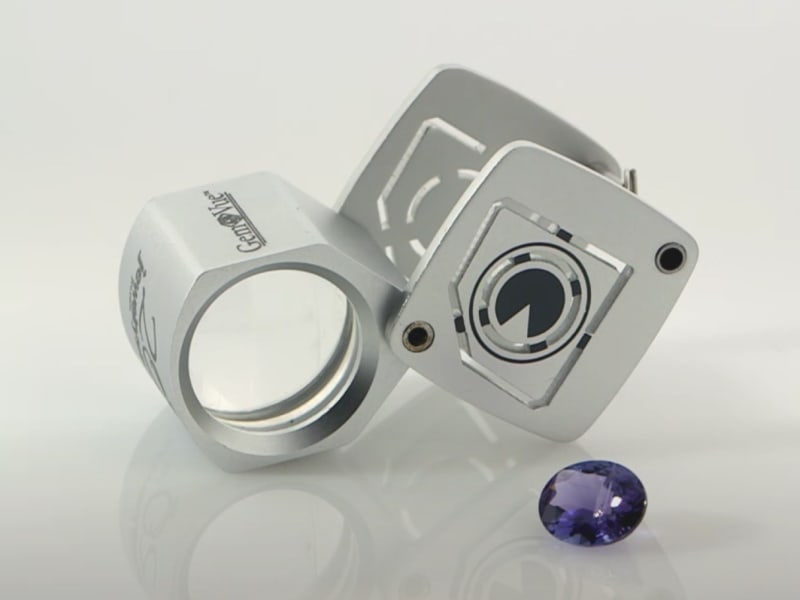If you’re considering a career in gemology, it’s first essential to establish what a gemologist is. Gemologists are experts in jewels and gems who identify and grade them. It’s common for gemologists to use a variety of manual and digital tools. This helps in their processes of accurately identifying, grading, and appraising gems.
Gemologists perform a variety of duties, depending on their title and the place they work. While there are many interchangeable disciplines or shared knowledge between gemologist jobs, each role has a different array of duties. Some of the duties gemologists perform are:
- Rate the gems: Some gemologists rate gems for color, quality, and clarity to help customers compare the value of gems.
- Establishing value: After establishing ratings and grades for gems they evaluate, gemologists can assign a monetary value to them.
- Maintaining documentation: It’s common for gemologists to list and track the gems they grade in a database, and maintaining these records is also a common duty.
- Writing industry reports: Occasionally, gemologists write reports and articles for publications in the jewel and gemstone industry.
- Advising customers: In some work environments, gemologists may advise customers on the jewels or gems to consider taking into account their budget and needs.
- Continue education: Gemologists typically continue their education with supplementary courses to make sure they’re fully equipped with up-to-date knowledge.
10 essential tips to become a gemologist
Before you begin your career as a gemologist, it’s important to understand what jobs gemologists typically do. With a gemologist’s expertise in gems and jewels, there are several paths that they can take into a variety of disciplines, such as sales, design, or manufacturing. Some of the most common jobs for gemologists are:
- gemstone auctioneer
- bulk gem buyer
- gem appraiser who knows in depth jewelry appraising
- jeweler
- laboratory gemologist
- jewelry designer and maker
Each of these occupations has its own set of requirements in their training, education, and vocational skills. For this reason, it’s wise to treat the first step of your career in gemology as a stage of familiarization with the various options available. This way, you can better align your career path with the requirements of your chosen path.
2. Attend Gemology school
To begin your chosen career path as a gemologist, start researching gemology schools. Find an education provider that aligns with your budget and teaches its students the relevant knowledge for the path you’ve chosen. Remember, you can always keep your options open by studying broadly to give yourself multiple opportunities once you’ve completed your education. For instance, you may decide that you want to become a jewelry designer, but want to still be qualified to grade and appraise gems.
Most gemology programs provide their graduates with a diploma, although it’s also possible to complete introductory courses or gain more advanced education. Some education providers offer gemologist online courses, which allow students to learn remotely. Not all education providers offer the FCGmA (Fellows of the Canadian Gemological Association) certification needed for some roles, so make sure the provider you choose offers the particular qualifications required for your chosen path.
3. Earn Certification & more Advanced Certifications
There are a few certifications that you can earn in your gemological education. In some schools, once you’ve completed their professional program, aimed to equip students with the knowledge required to competently assess gems and jewels, they can sit examinations to earn a gemologist course in India – fellowship certification (FCGmA). This certification is commonly a prerequisite for positions as an appraiser.
After students have gained their fellowship certification, they can sit for their “Gem-A” exams, which provide a diploma in geology. The Gemologist Institute of America GIA has the best courses and certifications for the gemologist role.
To work with jewels, you don’t necessarily need a fellowship certificate or a diploma in gemology, but having these advanced qualifications are required for more advanced roles. These certifications also promise a higher degree of certainty in your ability as a gemologist. Holding these advanced certifications can equip you to provide more value working as a gemologist for a jeweler or manufacturer.
4. Find an Apprenticeship
A gemologist apprenticeship is an excellent opportunity for individuals interested in the field of gemology. Gemology is the science of studying and evaluating gemstones, including their identification, grading, and valuation. As a gemologist apprentice, you will have the chance to learn from experienced professionals in the industry and gain hands-on experience in various aspects of gemstone analysis.
During your apprenticeship, you will be exposed to the fascinating world of gemstones, learning how to identify different types of gems, assess their quality, and understand their value. You may also have the opportunity to work with gem-cutters and jewelers to understand the process of transforming rough gemstones into exquisite jewelry pieces.
By participating in a gemologist apprenticeship, you can develop a wide range of skills, including gemstone grading, gem identification techniques, and gemological equipment handling. This experience will provide you with a solid foundation for a successful career as a professional gemologist.
5. Build your Network

As with so many careers, opportunities for jobs, sales, and acquisitions often arise primarily through networking. During and after your education, it’s wise to build your gemologist network. With a collegial network in place, you can find job opportunities, learn about professional development training, and have a support system in place.
6. Explore the ethics of Jewel and Gem sources
A Gemologist is a professional who specializes in the study and evaluation of gems and precious stones. When it comes to exploring the ethics of jewel and gem sources, a Gemologist plays a crucial role. They are responsible for examining the origin, quality, and authenticity of gems, ensuring that they are sourced ethically and sustainably.
Ethics in the gem industry involve various factors, such as fair trade practices, environmental sustainability, and labor conditions. Gemologists analyze the mining practices employed to extract gems. This is ensuring that they do not contribute to environmental degradation or harm local communities. They also evaluate the supply chain to ensure that gems are not obtained through exploitative or illegal means.
By examining gem sources, Gemologists contribute to the promotion of ethical practices in the industry. Their expertise helps consumers make informed choices, supporting the demand for responsibly sourced gems. Ultimately, the work of Gemologists helps to create a more transparent and sustainable gem industry, where ethical considerations are prioritized alongside beauty and rarity.
7. Shadow Professional Gemologists
Shadowing working gemologists can help you determine which gemology career appeals the most. Experiencing a variety of work environments and responsibilities can help to inform you of careers you might excel in more than others. For instance, you may thrive in a sales environment, more than in a manufacturing role, but not realize this until you’ve shadowed someone doing each of these positions.
8. Consider Business Classes
For many, career paths in gemology lead to working as a jeweler, in which the primary deliverable is making sales. If you have ambitions of opening your own jewelry store, business classes can help you start and manage your own company by giving you the essential acumen required to run a business. With a combination of knowledge in gemology and business principles, you stand a much higher chance of succeeding.
9. Explore Online Options
There is an increasing number of online jewelers who are quickly gaining market share over some physical jewelry stores. It’s wise to research these online options to see if they may suit you as much as or more than brick-and-mortar establishments. Working as a jeweler online involves less face-to-face customer service, and I higher degree of administrative communication skills.
10. Be thorough with the use of Gemologist Tools

- Microscope: The microscope is used for gem identification and the identification of internal and surface characteristics. Gemstone grading is done at 10x magnifications, although a gemologist may view stones at much higher power to determine treatments and characteristics

- Loupe: A handheld magnification tool, the loupe is used for identification and grading in much the same manner as the microscope. If you are new to gemstone shopping, it is important to familiarize yourself with the correct use of the loupe. Hold the loupe in your left hand close to your eye, and using gem tweezers, bring the gemstone up to the loupe until it is in focus. Learn to discern with your own eye and become a connoisseur of gemstones.
- Micrometer: Used for precise measurements, the gemologist lab will use a micrometer such as a Leveridge gauge to determine dimensions such as average girdle diameter, total depth, and length and width.
- Refractometer: Each gemstone will bend light in a particular way. The refractometer is used to measure the refractive index or RI which is a key indicator of a gemstone’s identity as well as measure the optic sign.
- Spectroscope: Measures the amount and type of light absorption in a gemstone. The two types of spectroscopes used are diffraction grating and prism.
- Polariscope: Used to make determinations regarding the optic properties of gemstones, the polariscope is an asset when distinguishing natural gemstones from synthetics.
- Heavy liquids: Used to determine the specific gravity of gemstones. Gemstones immersed in heavy liquids must be un-mounted or “loose” gemstones for specific gravity to be determined.
Final Thoughts
Becoming a gemologist requires dedication, continuous learning, and hands-on experience. By following these tips, you can embark on an exciting journey into the world of gemstones. You can become a knowledgeable professional in this field. If you need further assistance or have any specific questions, feel free to ask!







